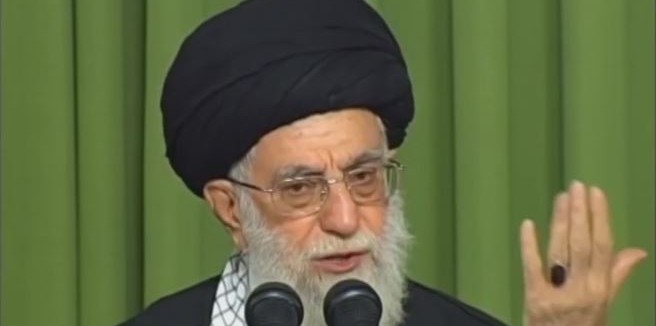Talks in Vienna continued on Sunday with few public developments, as negotiators struggled to work around a new set of red lines laid down in a speech last week by Iranian Supreme Leader Ayatollah Ali Khamenei.
Khamenei’s speech included demands for new Western concessions on a range of issues that the Obama administration had already assured lawmakers and journalist were settled in the last round of talks in Lausanne, Switzerland. French Foreign Minister Laurent Fabius implicitly pushed back against Khamenei’s speech with his own comments yesterday, reasserting three “indispensable” conditions long demanded by the international community: that Iran submit to an intrusive inspection regime necessary to verify a deal, that an agreement include restrictions on centrifuge research and development, and that sanctions be automatically reimposed if Iran violates its obligations.
Iranian Foreign Minister Mohammad Javad Zarif will depart from Vienna this afternoon to return to Tehran. It is widely expected that he will brief the country’s top leadership on the West’s stance in the aftermath of the Supreme Leader’s demands, and then he will return after one day.
The new concessions demanded by Khamenei would gut measures in the final agreement that the Obama administration has insisted would at least temporarily roll back Iran’s nuclear program. These measures had been codified months ago as parameters in the April 2 announcement by the P5+1 global powers and Iran.
Khamenei demanded that the West pull back from core understandings about uranium enrichment, explicitly declaring that “[c]ontrary to the Americans’ insistence, we do not accept long-term, 10-year and 12-year restrictions, and we have told them the acceptable number of years for restrictions.” The debate is bound up with a more subtle one about centrifuge research and development, and concessions on either would deepen concerns that Iran seeks to use the roughly 10-year deal to perfect elements of its nuclear program that have been stymied in recent years. Fabius’s response – insisting that R&D restrictions must be robust – are being perceived by observers as pushback to the scenario. President Barack Obama had already acknowledged to NPR a few months ago that the deal will enable Iran to go nuclear at will within 3 or 4 years of the deal expiring.
Khamenei also demanded that the P5+1 give up long-standing requirements that Iran to submit to sufficient inspections by the United Nations’ nuclear watchdog, the International Atomic Energy Agency (IAEA). Top analysts have been unequivocal that inspectors must have access to military sites where the Iranians might be conducting atomic work, a point that has long been echoed by Democratic and Republican lawmakers. Fabius’s insistence on access is in line with assessments published earlier this month by Olli Heinonen, a 27-year IAEA veteran and a former deputy director at the agency, that outline the minimum requirements inspectors would need under a good deal:
Transparency arrangements, including the “go anywhere, anytime” visits that allow inspectors to gain the access and information to sites, material, equipment, persons, and documents, have to form part of the verification process. The recent statement of Ayatollah Khamenei, “As it has already been said, no permission will be given to them for inspecting any of the military sites as well as for interviewing nuclear scientists and [scientists in] other sensitive disciplines and encroaching upon their privacy,”21 demonstrates the challenge P5+1 negotiators are facing. Without unfettered access to people and all sites in Iran, and if limitations and sanctuaries are carved out, it will be impossible to convincingly certify that Iran is fully complying with its undertakings.
A third requirement outlined by Fabius – his emphasis on the ability to restore sanctions in case of Iranian cheating – gestures toward an ongoing debate about the degree to which an agreement between the P5+1 and Iran will shred the international sanctions regime. The Obama administration has elevated the promise of a so-called snapback mechanism into a core assurance to Congress. The claim that the Iranians can be deterred by the threat of reimposing some sanctions has been met with broad doubt. Former Secretaries of State Henry Kissinger and George Shultz took to The Wall Street Journal after the last round of talks to emphasize that any snapback “is unlikely to be as clear or as automatic as the phrase implies.” David Rothkopf, CEO of The FP Group, described the sanctions regime as “the Humpty Dumpty of foreign-policy mechanisms – nearly impossible to put back together again once shattered.”
[Photo: Khamenei.ir / YouTube]




